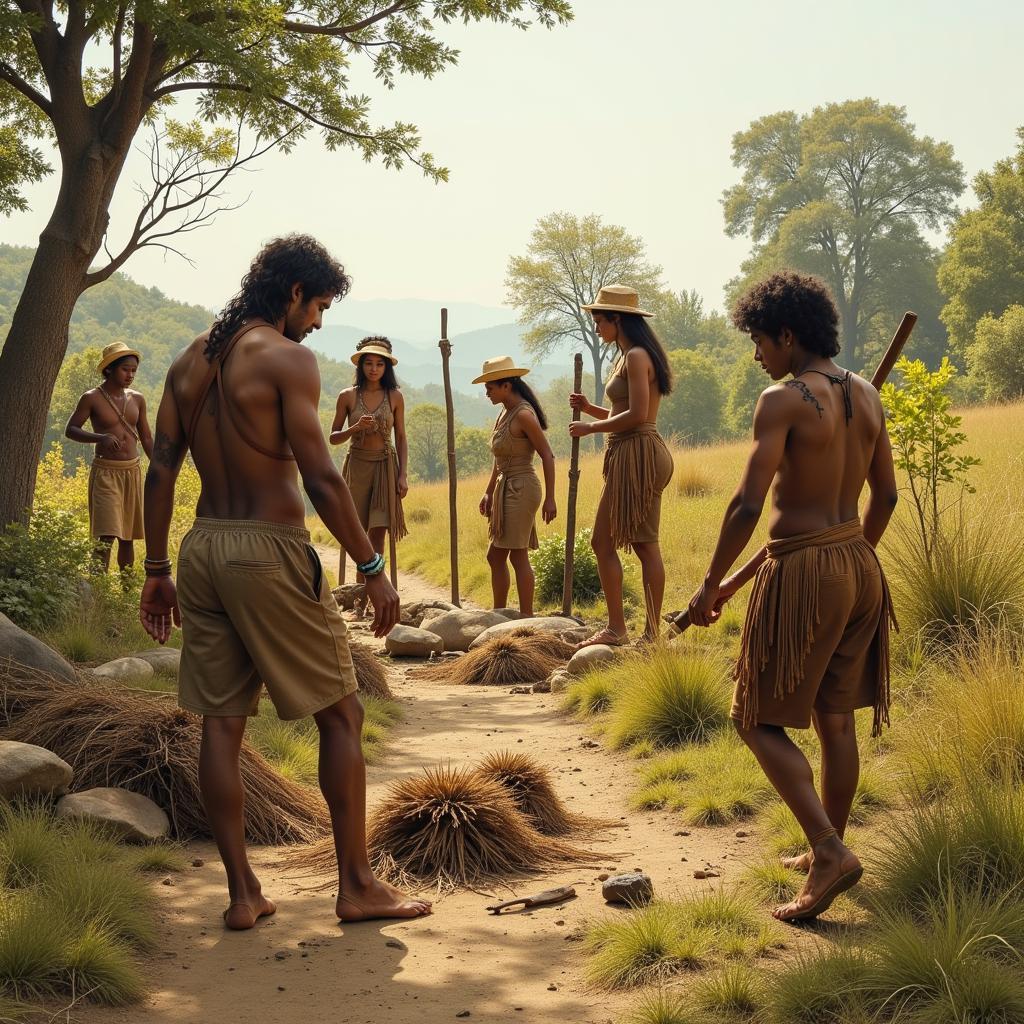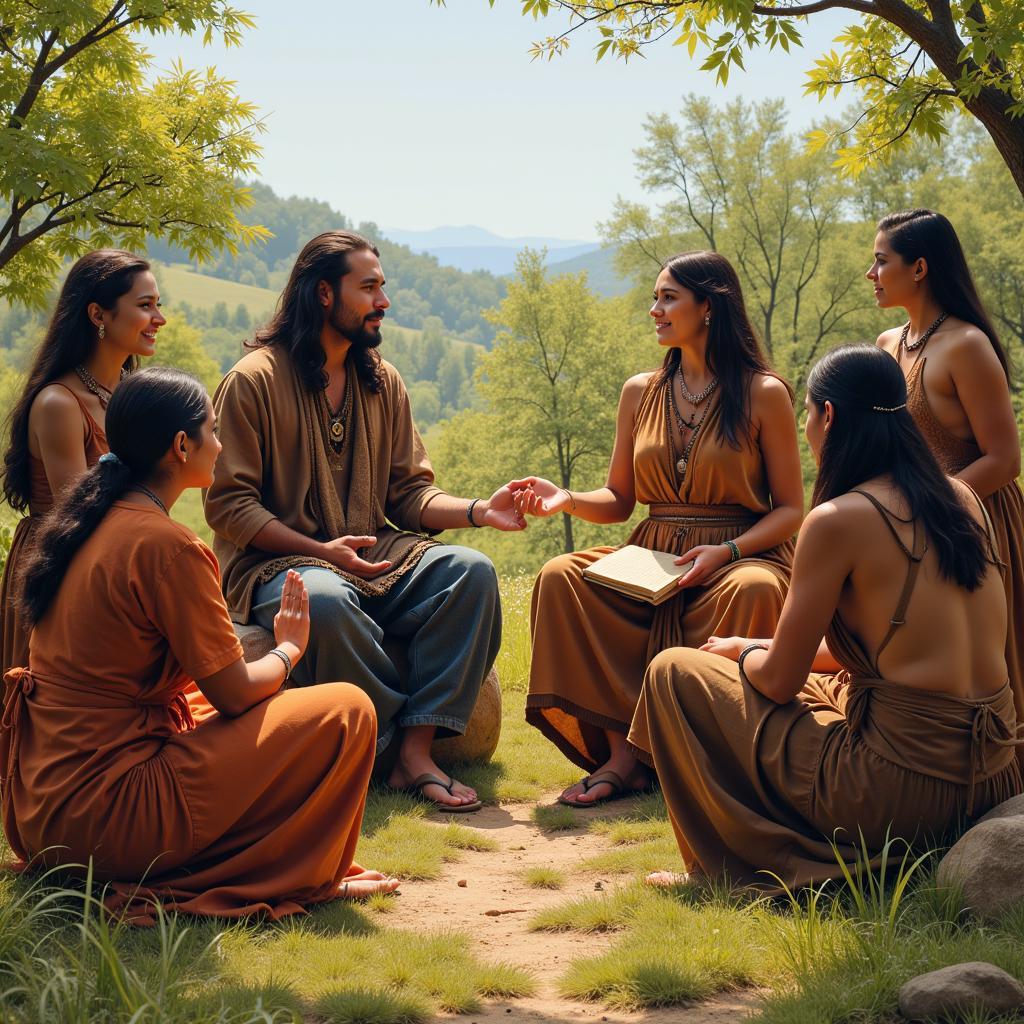Band Societies represent one of the oldest forms of human social organization, characterized by small, nomadic groups of people connected by kinship and shared resources. These societies, often based on hunting and gathering, offer a unique window into a way of life vastly different from our own complex, industrialized world. They provide valuable insights into human social dynamics, conflict resolution, and the possibilities for peaceful coexistence. Let’s explore the fascinating world of band societies.
The Structure and Characteristics of Band Societies
Band societies, typically comprising between 20 and 100 individuals, operate on the principles of egalitarianism and shared decision-making. Leadership is informal and based on influence rather than authority. There are no formal laws or institutions; [informal disputes in band societies may involve] discussions and mediation by respected elders. Kinship ties play a crucial role in social cohesion, and cooperation is essential for survival. Resource sharing and reciprocity are integral to the band’s way of life, minimizing social inequalities and fostering a strong sense of community.
What does a typical day look like in a band society? Members engage in activities like hunting, gathering edible plants, and crafting tools. Labor is divided based on age and gender, with everyone contributing to the group’s well-being. Evenings are often spent storytelling, sharing knowledge, and strengthening social bonds.
 Daily Life in a Band Society
Daily Life in a Band Society
Conflict Resolution and Peacekeeping in Band Societies
How do band societies maintain peace and resolve conflicts? While they lack formal legal systems, band societies have developed sophisticated mechanisms for managing disputes. Emphasis is placed on restoring social harmony rather than punishment. Informal discussions, mediation by elders, and public apologies are common strategies for addressing grievances. The focus is on resolving the underlying issues and preventing future conflicts. This emphasis on peaceful conflict resolution contributes significantly to the stability and longevity of band societies. Avoiding conflict through sharing and collaborative decision-making is also a key element in maintaining peace.
 Conflict Resolution in a Band Society
Conflict Resolution in a Band Society
Band Societies in the Modern World
Do band societies still exist today? While the traditional way of life for many band societies has been impacted by modernization and globalization, some groups continue to maintain elements of their ancestral customs and social structures. Studying these [modern hunter gatherer societies] offers valuable insights into human adaptability and the enduring power of community. These societies face numerous challenges, including encroachment on their traditional lands, loss of access to resources, and pressure to assimilate into dominant cultures. Understanding and supporting their right to self-determination is crucial for preserving their unique cultural heritage. Furthermore, studying their social structures and conflict resolution methods can offer lessons for building a more peaceful world.
Conclusion: Learning from Band Societies
Band societies, with their emphasis on egalitarianism, cooperation, and peaceful conflict resolution, offer valuable lessons for our modern world. By studying these societies, we can gain a deeper understanding of human social dynamics and the potential for creating more just and harmonious communities. While the challenges facing band societies today are significant, their resilience and enduring cultural heritage serve as a testament to the strength of the human spirit. By supporting their right to self-determination and learning from their ancient wisdom, we can work towards a more peaceful and sustainable future for all. Exploring the dynamics of these societies offers a unique lens through which we can examine our own social structures and strive towards building a more peaceful world.
FAQ
- What are the key characteristics of band societies? Small size, nomadism, kinship ties, egalitarianism, and informal leadership.
- How do band societies resolve conflicts? Through informal discussions, mediation, and a focus on restoring social harmony.
- Do band societies still exist today? Yes, although many have been impacted by modernization, some continue to maintain aspects of their traditional way of life.
- What are the challenges faced by modern band societies? Encroachment on their land, loss of access to resources, and pressure to assimilate.
- What can we learn from band societies? The importance of cooperation, sharing, and peaceful conflict resolution for building sustainable communities.
- Where can I find more information on the dynamics within band societies, including informal disputes? You can explore more about [informal disputes in band societies may involve] on our website.
- Are there resources available about the Bandon Historical Society? Yes, learn more by visiting our page on the [Bandon Historical Society].
Related Questions & Further Reading
- Are you interested in learning more about how societies function in games like Crusader Kings 2? Check out our article on [CK2 societies].
- Do you want to know more about supporting animal welfare organizations? Visit our page on the [Reptile Humane Society].
- Want to learn more about contemporary hunter-gatherer groups? Explore our article on [modern hunter gatherer societies].
If you need any assistance, please contact us:
Phone: 02043854663
Email: [email protected]
Address: Khu 34, Bắc Giang, 260000, Vietnam
Our customer service team is available 24/7.